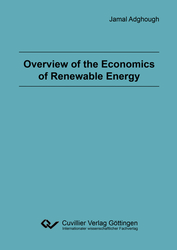| Departments | |
|---|---|
| Book Series (96) |
1381
|
| Nachhaltigkeit |
3
|
| Gesundheitswesen |
1
|
| Humanities |
2370
|
| Medienwissenschaften | 16 |
| Theology | 57 |
| Philosophy | 102 |
| Law | 424 |
| Economics | 851 |
| Social sciences | 418 |
| Sports science | 48 |
| Psychology | 233 |
| Educational science | 190 |
| History | 183 |
| Art | 111 |
| Cultural studies | 166 |
| Literary studies | 117 |
| Linguistics | 88 |
| Natural Sciences |
5408
|
| Engineering |
1795
|
| Common |
98
|
|
Leitlinien Unfallchirurgie
5. Auflage bestellen |
|
Advanced Search
Overview of the Economics of Renewable Energy (English shop)
Jamal Adghough (Author)Preview
Extract, PDF (570 KB)
Table of Contents, PDF (550 KB)
With the start of the Industrial Revolution in the early 18th century, the value of the term ‘energy’ became more important than ever before. Thus, energy development was considered an integral part of economic development, especially in the industrialised countries and has since then been playing a role as a critical and key factor in the global economy.
This paper presents an overview of the renewable energies which are being championed as a potentially significant new source of jobs and growth, especially in OECD countries, and are a means of addressing environmental and energy security concerns. In most countries, governments have invested large amounts of public funds to support the development of RE and are thus requiring energy providers to sell significant quantities of it to the public. In fact, accelerating the deployment of renewable energy will fuel economic growth, create new employment opportunities, enhance human welfare, and contribute towards a climate-safe future. There is unmistakably a strong link between the availability of energy resources and economic development (Salah Abo-Sedra et al. Journal of Energy 2014).
Apergis and Payne in their work “Energy Consumption and Economic Growth”, as well as Wolde-Rufael (Energy Economics, 2009), argue that the rise in energy demand in African countries is closely linked to income. In other words, energy consumption interacts with economics. This review paper explores this interaction and with help of recent empirical research, shows there are economic benefits and achievements in the renewable energy sector for especially those which are provided by an international institution such as IRENA and OEERE. After having shown the relationship between RE and economics, the economic benefits and the achievements in the renewable energy sector are mentioned. Finally, the benefits of the global trade in RE investment are shown.
| ISBN-13 (eBook) | 9783736987654 |
| Language | English |
| Page Number | 25 |
| Edition | 1. |
| Publication Place | Göttingen |
| Publication Date | 2018-05-15 |
| General Categorization | Non-Fiction |
| Departments |
Economics
Energy engineering |
| Keywords | energy, renewable energies, OECD countries, environmental and energy security concerns, African countries |








